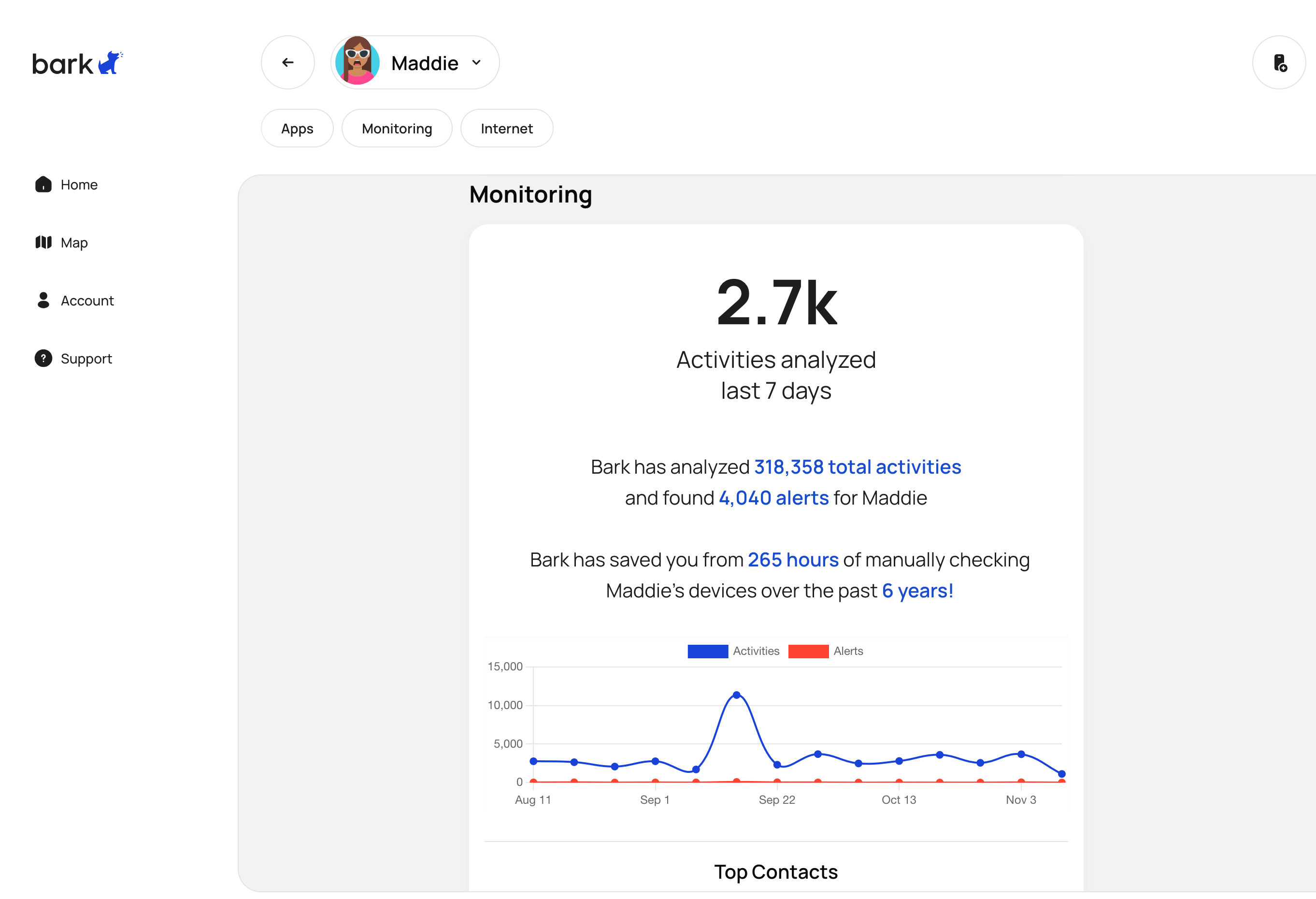Sponsored by Bark
The role of AI in online safety: How technology helps parents protect their kids
Instead of relying on AI, use it for precautionary measures

Artificial intelligence (AI) is the latest frontier of the technology industry. It has significantly disrupted many sectors, including online security.
It has brought new advancements to online security but poses some challenges. This article will discuss the role of AI in keeping your kids safe online.
Bark: Best parental control for customization
Techradar editors praise the service for its custom controls, "smarter-than-most" app content filtering, as well as SMS and email monitoring. See here for details on Bark's phones and pricing plans.
Techradar Pro Approved Sponsored Offer
The risks kids face online
Before discussing how AI improves online safety, knowing the risks kids face when surfing the web is crucial. They include:
- Malware: Malicious actors often abuse websites to install malware on unsuspecting kids’ devices. They do this by enticing kids to download malware-laden games, movies, music, and other favorite content.
- Inappropriate content: Kids can get exposed to content inappropriate for their age, such as adult movies and extremely graphic footage.
- Privacy invasion: Kids can be persuaded to share sensitive information online, which exposes their identity and leaves them vulnerable to hacks.
- Cyberbullying: Kids can face harassment, threats, and impersonation online, especially on social media platforms.
- Predators: Children can unknowingly interact with strangers who try to exploit or groom them.
How AI improves online safety
1. Real-time threat detection
AI has made real-time threat detection more effective than ever. AI-powered algorithms can analyze the websites your kids visit and identify threats like inappropriate content, malware, and cyberbullying.
Hence, you’ll be alerted to take swift action and protect your kids against these threats. When using a parental control app, you can set it to block such websites automatically.
AI systems work 24/7, unlike humans, who work limited hours. While humans remain crucial in detecting and countering cyber threats, AI has made the process much more efficient. It can identify threats and take immediate action or alert humans to take the required action.
AI systems are also highly scalable. They can simultaneously monitor multiple kids’ devices and alert you about potential threats.
2. Screen time management
Artificial intelligence can assist parents in setting proper screen time limits for kids. Parental control apps can use it to analyze how much time your kids spend on various apps, then suggest healthier habits they should adhere to.
You'll have the final say on whether to implement these limits, so don’t worry about AI controlling your kids.

3. Detailed reporting
Thanks to AI, online security apps can provide detailed reports about your kids’ browsing habits, including the sites they visit and the time spent on each site over a specific period. You can use this data to detect and advise your kids against unhealthy browsing habits.
Your kids’ browsing habits change continuously, and online security apps can generate new reports over time.
These reports will help you formulate healthy browsing habits as your kids grow.
4. Cyberbullying and predation detection
AI helps social media platforms to monitor account patterns for cyberbullying and online predation. These accounts are then blocked to prevent harm to kids.
For long, detecting suspicious online accounts has been a game of cat and mouse, but AI has given social media platforms the upper hand.
5. Personalization
The uniqueness of AI systems is their ability to create personalized solutions. AI enables online security apps to adapt to your child’s usage habits and maturity level.
For instance, if your child surfs the web excessively, apps can alert you and suggest personalized recommendations to address this issue.
Gone are the days of one-size-fits-all. AI has placed personalization at the center of online safety.
Challenges
While AI has many benefits regarding online safety, it’s not an all-around solution. Parents harnessing AI to protect kids online face challenges identified below.
1. Privacy concerns
AI systems can monitor your kids’ browsing activities to detect threats. But this information is usually sent to external servers for analysis, exposing your kids’ online habits to third parties.
Ensure any parental control app comes from a trusted company with no history of data negligence or malicious practices. For instance, some online security apps have been found to sell anonymized user data to third-party advertisers.
Research extensively when choosing a parental control app, ensuring you choose one with top-notch security practices to protect user data.

2. Overreliance
Parents can over rely on AI systems for online protection, but this isn’t the correct approach.
Despite their rapid disruptions, AI is still in its infancy, with the vulnerabilities that come with early-stage technologies. For instance, it can falsely flag safe sites and frustrate your kids’ browsing sessions. AI can’t detect all online threats despite its powerful capabilities.
As a parent, you shouldn’t see AI as a replacement for monitoring your kids’ online activities and ensuring they interact safely. It’s more of an assistant that multiplies your productivity.
You should still have open conversations and educate your kids about the risks of the internet.
Monitor their usage manually and block suspicious sites to prevent harm. Keep educating as your kids grow and develop new online habits.
Best practices for using AI in online safety
1. Staying informed
Stay informed about the latest threats emerging in the cyber world. Read articles and reports to learn about new cyber threats and how to protect kids against them.
This way, you’ll stay ahead of the problems AI systems haven’t been familiarized with.
2. Education
As mentioned, AI is not a replacement for educating kids about internet safety. Let your kids know the risks of the internet and why they’re being protected from it.
Discuss safety from the perspective of empowering themselves to use the internet stress-free.
Discuss guidelines like online gaming, social media, and website restrictions. This way, your kids will understand why they’re being protected, instead of assuming they’re being restricted for nothing’s sake.
3. Choose trusted systems
Be careful about the parental control tools you install on your kid’s device. Don’t download any app without researching its data protection practices and previous safety records.
Avoid tools made by companies you can hardly identify or those with a history of lax security practices.
The good thing is that existing, trusted parental control apps have incorporated AI into their feature set. Hence, you can download these trusted tools and give your kids enhanced online protection.
Sign up to the TechRadar Pro newsletter to get all the top news, opinion, features and guidance your business needs to succeed!
Stefan has always been a lover of tech. He graduated with an MSc in geological engineering but soon discovered he had a knack for writing instead. So he decided to combine his newfound and life-long passions to become a technology writer. As a freelance content writer, Stefan can break down complex technological topics, making them easily digestible for the lay audience.

